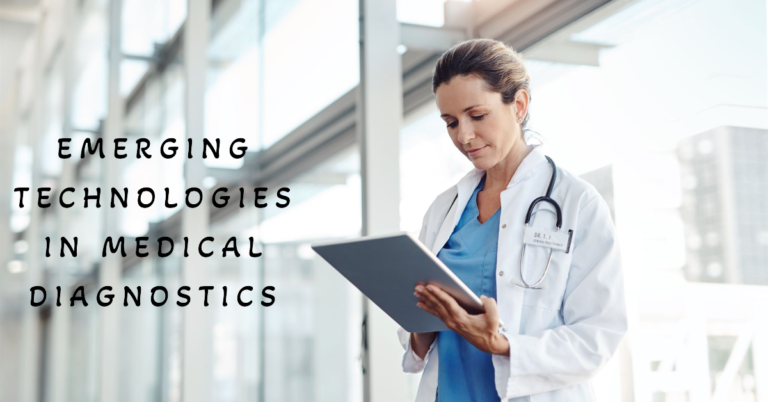Introduction:
Innovation in medical diagnostics is pivotal for advancing healthcare, ensuring diseases are detected earlier and treatments are more effectively tailored to individual patients. Integrating new technologies into diagnostic practices enhances the accuracy of diagnoses and streamlines the process, making it faster and less invasive for patients. As technology evolves, the healthcare landscape is transformed, enabling more precise and predictive medicine to dramatically improve patient outcomes.
Emerging technologies fundamentally transform healthcare by introducing more sophisticated diagnostic tools and methods. These innovations provide critical insights into patient health, enabling early detection of previously difficult-to-diagnose conditions at initial stages. Integrating these technologies improves the effectiveness of medical treatments and interventions, leading to better health outcomes and reduced healthcare costs. This transformative impact underscores the importance of embracing and developing new technological solutions within medical diagnostics.
Wearable Diagnostic Devices:
“The rise of wearable technologies has marked a significant shift in how health monitoring and diagnostics are approached. Wearable devices, such as smartwatches and fitness trackers, continuously collect health data from the user, providing real-time insights into heart rate, blood pressure, glucose levels, and more. This constant monitoring allows for early detection of potential health issues before they develop into more serious conditions.” Says Pareen Sehat, Clinic Director of Wellbeings Counselling
Examples of the impact of wearable devices on patient care include the ability to monitor cardiac conditions from home, detect irregular heartbeats, and even predict the likelihood of episodes like strokes or heart attacks. These devices empower patients to take a more active role in managing their health, with real-time data that can be shared with their healthcare providers for more personalized care and optimized treatment plans.
Genomics and Personalized Medicine:
Genomic medicine advancements provide unprecedented insights into the genetic factors that influence diseases, allowing for more personalized medical care. By understanding a patient’s genetic profile, medical professionals can tailor diagnostic and treatment strategies that are significantly more effective for the individual. This approach enhances the effectiveness of treatments and minimizes the risk of adverse drug reactions and other complications.
“The development of personalized treatment plans based on genetic information is particularly transformative in areas like oncology, where cancer treatments can be customized based on the genetic mutations found in tumor cells. This precision medicine approach ensures that patients receive the most effective therapies designed to target their specific disease profile, leading to better treatment outcomes and improved chances of recovery.” Says Tiffany Payne, Head of Content at PharmacyOnline.co.uk
Telemedicine and Remote Diagnostics:
“The expansion of telemedicine has been one of the most significant trends in healthcare, particularly in diagnostics. Remote diagnostic tools and digital communication platforms allow medical professionals to assess, diagnose, and treat patients who may not be able to visit healthcare facilities physically. This improves access to care for remote and underserved populations and enhances the ability to manage chronic diseases from home.” Says George from Taoist Wellness
Remote diagnostics leverage technologies such as mobile health apps, remote monitoring devices, and cloud-based data analysis systems that transmit and analyze medical data in real-time. This approach reduces the need for frequent hospital visits, minimizes healthcare delivery costs, and enables continuous patient health monitoring, which is crucial for conditions like diabetes and hypertension.
Blockchain for Secure Medical Data:
“Blockchain technology offers revolutionary potential to secure medical diagnostic data and enhance patient privacy. By allowing the creation of decentralized and tamper-proof data records, blockchain can protect sensitive medical information from breaches and unauthorized access. This technology ensures that patient records are kept private and secure, which is critical given the increasing frequency of cyberattacks on healthcare institutions.” Says Alex Constantinou – MD at The Fitness Circle
Blockchain technology can facilitate the seamless exchange of medical data among healthcare providers, improving the coordination of care and eliminating inefficiencies. For instance, blockchain can enable the secure sharing of diagnostic results across different healthcare providers, ensuring that each party has immediate access to accurate and up-to-date patient information. This enhances the quality of care and streamlines the diagnostic process.
Analyzing and Measuring Success:
“In social media marketing, it’s crucial to continuously analyze and measure the success of your campaigns to understand their effectiveness and identify areas for improvement. Tools and metrics such as engagement rates, conversion rates, and ROI are integral for assessing the impact of your social media efforts. By closely monitoring these metrics, businesses can make informed decisions to optimize their strategies and achieve better results.” Says Sophia Ensor, Social media executive at Centre for Surgery
Advanced analytics platforms also allow marketers to delve deeper into the data, providing insights into user behavior, campaign performance, and more. These insights are invaluable for refining targeting strategies, content offerings, and overall campaign tactics. Regular analysis helps ensure that social media advertising efforts align with business goals and deliver the expected outcomes.
Conclusion:
Embracing the power of social media advertising is essential for businesses looking to expand their reach and enhance their marketing efforts. By understanding and leveraging the strategies discussed, businesses can tap into a vast audience, engage with customers meaningfully, and drive significant business results. As social media platforms evolve, staying adaptable and informed about the latest technologies and trends will be key to maintaining a competitive edge and achieving continued success in social media advertising.

